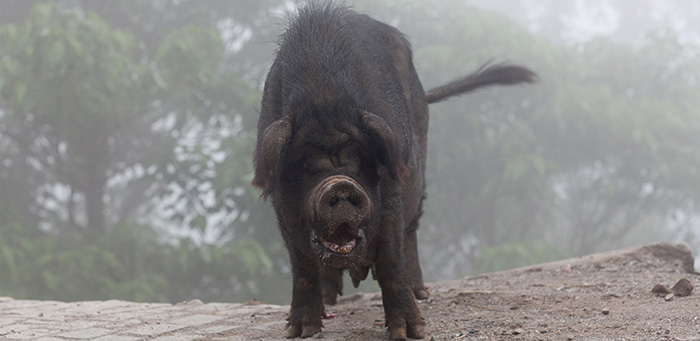The Chinese authorities are undertaking a major surveillance programme following the confirmation of two African swine fever (ASF) cases in different parts of the country.
There are fears China could be facing a significant ASF problem after a second outbreak of the disease was confirmed at a slaughter house in Henan city last week when 30 cases out of 260 pigs were detected during ante-mortem inspections. Disease control measures are in place, including culling affected and susceptible animals, and epidemiological investigations are taking place.
In a disease update, the Animal and Plant Health Agency (APHA) said it was ‘concerning’ that the case involved the long distance movement of live pigs from a live swine market in Heilongjiang Province to the slaughter house, which is part of the WH Group, the largest pork production company in the world.
This is a region, with a high density of pigs, where expert advice suggested disease was most likely to enter China, APHA said.
More than 35.5 million pigs have been checked for ASF following the previous outbreak, confirmed on August 3, in a different part of China, the Liaoning province. The updated OIE report explains there were initially two farms involved under the same ownership, where pigs had died and the farms were depopulated.
In addition, over 10,000 samples have been tested, with seven samples testing positive from two villages nearby in which all the live pigs have now been depopulated. Transport of live pigs in and out of Shenyang City is not allowed.
Despite efforts to genotype the virus involved, it is difficult to pinpoint the exact source of infection, APHA said. The farms involved in the outbreak are reported to have been swill feeding the pigs since mid-June and 400 pigs died over the period of a month, which would be considered fast for inter-herd transmission if there was only a single point of infection, APHA said.
Negligible risk
APHA stressed that the risk to the UK from ASF in China was ‘negligible’. Currently, China is not approved for the import of fresh or frozen pig meat to the EU. However, some animal feed products are imported from China, and the agency is investigating other possible pathways.
But the overall risk given the current distribution of ASF in the EU and neighbouring countries is ‘low’, upgraded last year, following fresh outbreaks in central Europe.
“As with ASF in western Russia, Belarus, Moldova and the Ukraine, there are concerns around pork products from non-EU countries entering the EU in passenger luggage and then being discarded in areas where wild boar or domestic pigs are present,” the agency said.
Publicity campaigns are in place to discourage individuals from bringing pork products into UK. This includes:
- Reminding people that it is illegal to swill feed any sort of kitchen scraps, pork products or catering waste to domestic pigs, whether commercial or smallholdings, to feral pigs and to wild boar.
- A campaign to highlight the dangers of swill feeding has been launched
- All pig keepers should be aware that visitors to their premises should not have had recent contact with pigs and pig premises in the affected regions.
- Anybody returning from any ASF-affected area should avoid contact with domestic pigs, whether commercial holdings or smallholdings, areas with feral pigs or wild boar, until they are confident they have no contaminated clothing, footwear or equipment.
- Pig keepers and veterinarians should remind themselves of the clinical signs for ASF. Any suspect cases must be reported promptly. Click here for more information




